 Click To Return To Main Page |
 |
||||||||
 News |
 Eco-Journalists |
 Articles |
 Games |
 Links |
 Facts 'n Fun |
 Email Us |
 About Us |
 Guestbook |
|
|
The National Seal Sanctuary - Cornwall
Dreaming of licking an icecream!
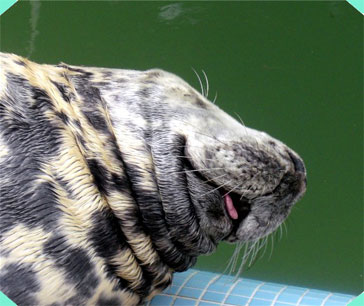 You may think that if you were a seal, you'd have a fun and carefree life, splashing around in the water with your best mates. Unfortunately, seals have a pretty tough life. They have natural predators like killer whales and sharks, but their biggest enemy is...US!
You may think that if you were a seal, you'd have a fun and carefree life, splashing around in the water with your best mates. Unfortunately, seals have a pretty tough life. They have natural predators like killer whales and sharks, but their biggest enemy is...US!
In Canada each year they carry out 'seal culls'. The fishermen complain that too many seals eat the fish they could be catching. They club them to death, skin them, take their fur and sell it. Last year, they killed 335,000 seals. They earn up to $100 for each seal they kill - so it makes them a lot of money. There's plenty of film available on youtube of seals and their pups being slaughtered, but I don't recommend you watch it. It's not something you can forget quickly. 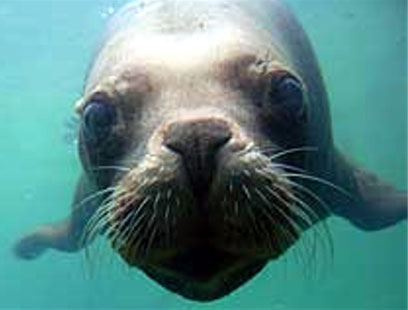 Seals get caught in fishing lines
Seals get caught in fishing linesThey swallow plastic bags They suffer horrific injuries or death from being mangled by boat propellers Fortunately, there are places that look after sick, injured and orphaned seals. 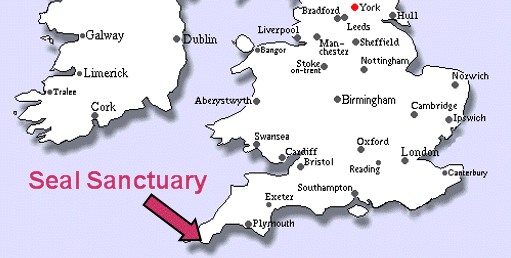 We were lucky enough to visit The National Seal Sanctuary (NSS)in Cornwall, England. People who find injured seals can ring the NSS and they will send a team to find the seal and bring it back to the Sanctuary.
We were lucky enough to visit The National Seal Sanctuary (NSS)in Cornwall, England. People who find injured seals can ring the NSS and they will send a team to find the seal and bring it back to the Sanctuary.
Here, they treat it with the right medicines (and plenty of fish!). When it has fully recovered, The Sanctuary release the seal back into the wild. Sometimes, the seal is too injured to ever fend for itself again so they have to stay at the Sanctuary for good...not a bad way to live out your life as the staff are very lovely and I'm sure the fish is tasty. ...and don't forget to brush your teeth!
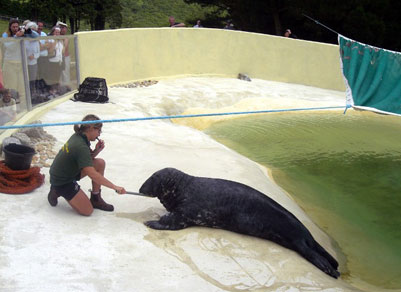 It all started when a baby seal was washed up on nearby St. Agnes beach and was found by Ken Jones and his wife. They looked after the seal and asked around if there was a 'seal hospital' somewhere. There were none. Ken decided to set up his own sanctuary. He realised 1 pool was not big enough for all of the injured seals, so he moved to Gweek in 1975.
Today, the sanctuary has 6 pools (not including the nursery pools), and a seal hospital.
It all started when a baby seal was washed up on nearby St. Agnes beach and was found by Ken Jones and his wife. They looked after the seal and asked around if there was a 'seal hospital' somewhere. There were none. Ken decided to set up his own sanctuary. He realised 1 pool was not big enough for all of the injured seals, so he moved to Gweek in 1975.
Today, the sanctuary has 6 pools (not including the nursery pools), and a seal hospital.
The kit used when rescuing seals
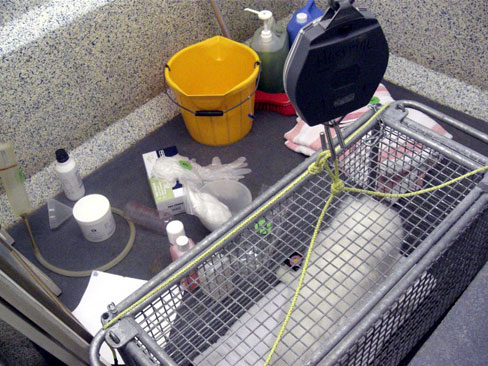 Magnus, a permanent resident in the Sanctuary, came from Edinburgh zoo. 14 years later, Snoopy, a resident from Edinburgh zoo also came to the Sanctuary. Snoopy and Magnus had both been at Edinburgh at the same time, so it was questioned if they were related. Research proved that Snoopy was Magnus's daughter. Now, they can be found eating and sleeping together. In fact, they're inseperable so it's as if they know they're father and daughter.
A funny thing about Magnus, is that when it is feeding time, he'll slap the water until he gets fish.
Magnus, a permanent resident in the Sanctuary, came from Edinburgh zoo. 14 years later, Snoopy, a resident from Edinburgh zoo also came to the Sanctuary. Snoopy and Magnus had both been at Edinburgh at the same time, so it was questioned if they were related. Research proved that Snoopy was Magnus's daughter. Now, they can be found eating and sleeping together. In fact, they're inseperable so it's as if they know they're father and daughter.
A funny thing about Magnus, is that when it is feeding time, he'll slap the water until he gets fish.
Sitting outside the Seal Sanctuary with Rachel, who was brilliant, and our friend Alex.
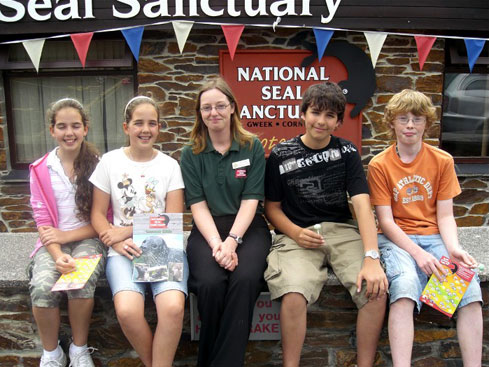 The Sanctuary not only takes in seals, but has grown to care for animals like:
The Sanctuary not only takes in seals, but has grown to care for animals like:Sharks Otters Ponies Goats and occasionally other marine animals like turtles and dolphins. We met Rachel who works at the Seal Sanctuary who gave us loads of information. We had a wonderful time there and we as well as seeing the seals, we got to hear stories about them which show that all animals have their own individual personalities. Make sure you visit the Seal Sanctuary, go to: www.sealsanctuary.co.uk/corn1.html. In fact, visit the website anyhow and see if you can work out the names of the seals we have in our photos. Email us and we'll tell you if you're right! Enjoying a snooze by the pool
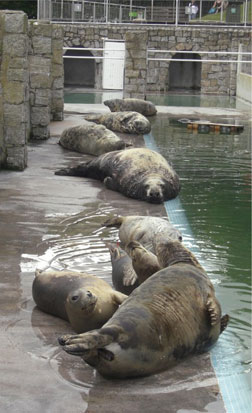 Seals are in the classification of: PINNIPEDIA. There are 4 families (types) of seals; Eared, True, Sea Lions, and Walruses. The National Seal Sanctuary is looking after Grey, Common, and Fur seals, as well as Californian and Patagonian Sea Lions. These seals can be found on English shores.
Seals are in the classification of: PINNIPEDIA. There are 4 families (types) of seals; Eared, True, Sea Lions, and Walruses. The National Seal Sanctuary is looking after Grey, Common, and Fur seals, as well as Californian and Patagonian Sea Lions. These seals can be found on English shores.
If you ever find a seal on a beach, rocks or elsewhere: DO NOT APPROACH OR TRY TO TOUCH IT As well as stressing the poor thing out, seals are wild animals (and you'd be wild if you just got trapped in a fishing line!) and are considered 'dangerous'. Instead do this: Pick up phone and ring: Southern England: 01326 221361 East England: 01485 533576 Scotland: 01631 720386 Australia: ORRCA (02) 9415 3333 (also for dolphins & whale rescue) Rest of the world; go to: www.pinnipeds.org/rehab.htm This site has contacts no's for everywhere Please report dead seals too. By Freya Wadlow Information sourced from: Statistics: http://news.scotsman.com/topics.cfm?tid=581&id=448042007 www.sealsanctuary.co.uk/corn1.html www.pinnipeds.org/rehab.htm Images: @Wadlows www.sealsanctuary.co.uk/corn1.html |